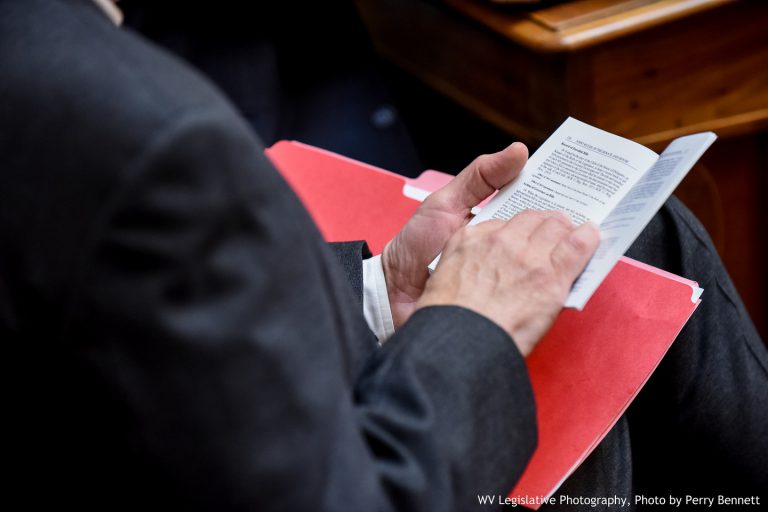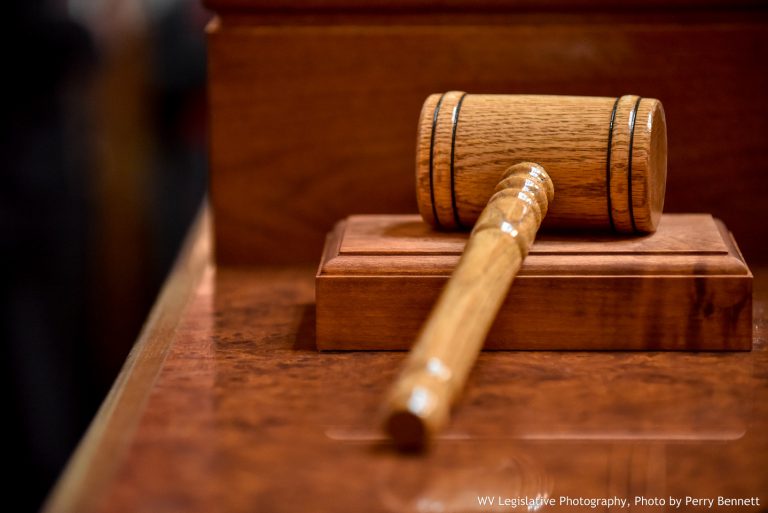As of 4 p.m., Wednesday, January 16, 2007, the eighth day of the 2008 Regular Session, 60 bills have been introduced. Another 635 carry-over bills from last session were reintroduced in the House of Delegates. A sampling of bills introduced include:
House Bill 4004 would provide funds for the maintenance, repair and preservation of statues located on the Capitol grounds. The money would come from a portion of the lottery fund as well as any appropriations, gifts and grants given to the “Lottery Maintenance, Repair and Preservation of Statues on the Capitol Grounds Fund.”
House Bill 4005 would extend the current tax credit for alternative fuel motor vehicles from the current 10 years to 20 years. It would also make the credit retroactive from the expiration date from the original tax credit.
House Bill 4012 would give a corporation net income tax credit for providing heating fuel or propane gas services at special reduced rates for low-income residential customers. The amount of the tax credit will be equal to the cost of providing the heating fuel or propane gas.
House Bill 4013 would require the Director of the Division of Veteran’s Affairs to establish a healthcare database between all of the state’s veteran’s hospitals. The database would provide veterans easy access to different care options.
House Bill 4015 would give teachers in “critical needs” areas of education a tax credit against personal income taxes for the first three years. If the teacher were still educating in a “critical needs” area after five years, the tax credit would equal 50 percent of the teacher’s taxes that are due. Areas labeled as “critical needs” would be decided by the State Board of Education.
House Bill 4020 would authorize disclosure of specific mental health records to the National Instant Criminal Background Check System. If an individual has been involuntarily hospitalized, ruled mentally incompetent in a court proceeding, or has regained the ability to own a firearm, their mental health records would be sent to the National Instant Criminal Background Check System.
House Bill 4021 would eliminate the requirement for a battery-powered strobe light to be attached to a self-contained self-rescue device. It would also extend the current theft and destruction penalties for certain pieces of coal mine equipment and property. The bill would establish criminal penalties for individuals who enter onto coal mine property to commit a felony or larceny.
House Bill 4022 would create the Indigent Defense Commission. The purpose of the commission would be to assist Defender Services with general policies and procedures. The commission would also provide additional management of the costs and administrations of the Public Defender Corporations. Members of the commission would include the Director of Public Defender Services, Director of Prosecuting Attorneys Institute and others appointed by the Governor.
House Bill 4023 would deny a student, between the ages of 15 and 18, a driver’s license if he or she does not obtain passing grades. A Driver’s Eligibility Certificate or other form of proof that the student meets the requirement must be presented before he or she is able to receive their license. A student who has a license has failing grades will have their license revoked.
House Bill 4024 would make the false reporting of a violent act a felony and would also add new language that would clearly define what “acts of violence” include. Some of those acts are: Unauthorized individuals carrying a weapon on school property, someone committing an action that is or could become life-threatening while on school property, and the action of kidnapping or holding hostages on school grounds.
House Bill 4025 would give further protection to whistle-blowers for reporting unsafe working conditions in mines. A miner who refuses to enter a mine that he or she deems unsafe cannot be discriminated against under provisions of this bill. If a miner feels they were discriminated against or unjustly compensated, they would be able to file a complaint that then would be thoroughly investigated.
House Bill 4026 would restrict the public’s access to concealed weapons’ permit records. Those allowed access to these permit records would include; the applicant or licensee themselves, a qualified executor of the estate for an applicant or licensee, an attorney at the behest of the applicant or licensee, and an authorized representative of the law enforcement for official duty purposes.
House Bill 4037 would reduce the state income tax for certain county, state and federal retirees. To accomplish this, there would be an increase in the amount excluded from the retiree’s income, not to exceed $20,000 when calculating the federal gross income for state personal income tax purposes.
House Bill 4038 would prohibit a person from undertaking the business of erecting, constructing, installing, altering, servicing, repairing or maintaining elevators without successfully completing the Qualified Elevator Inspector license from an examination organization approved by the Division of Labor Commissioner. The bill would be effective on the first day of January 2010. Failure to comply by the new guidelines would be a misdemeanor and carry various penalties.
House Bill 4042, or the Equal Parenting Act, would establish the presumption, unless otherwise disputed, of joint legal and physical custody of the children in child custody matters. The bill would call for equal parenting to be established so that the child or children spend the same amount of time with both parents. The only exception would be if it were shown that the child is or may be harmed. Proof that a child is at risk with one of the parents would require a written finding, not simply allegations alone.
House Bill 4047 would prohibit the usage of cell phones and other defined “text-messaging devices” while driving. The only exception would be in the case of an emergency or the use of a hands-free device. School Bus drivers would also prohibited from using a cellular device except under limited circumstances such as an emergency.
House Bill 4051 would only allow healthy beverages and healthy, nutritional foods, to be sold in county school systems. Fruits, vegetables, cheese, yogurt and whole grain foods were all mentioned as healthy and nutritional snacks. Each food or drink served could not contain more than 200 calories.
House Bill 4052 would establish a council within the Office of Maternal, Child and Family Health, to advise on maternal risk assessment. The purpose of the council is the need for a more absolute and uniform approach to the screening of at-risk or high-risk pregnancies performed by physicians. The advisory council would be comprised of various individuals including: Commissioner of the Bureau of Public Health, member of both a public and private provider of maternity services, Director of the Office of Maternal, Child and Family Health and a certified nurse midwife.
House Bill 4057 would authorize County Commissions to create a combined joint emergency services agency. This agency would obtain the rights and the responsibilities of emergency ambulance services, county fire associations, and county fire boards. A board comprised of between five to 15 individuals would manage the agency.
House Bill 4058 would require group insurance companies to furnish their claims experience upon the request of their policyholders. The insurer must submit these claims within 30 days of the initial request unless that information was sent at least six months prior to the group policyholder.




 In lieu of the usual prayer in the House Chamber, House of Delegates members were treated to a performance by the Nicholas County bluegrass band, Laurel Creek. The band played two songs, “Heavens Jubilee” and “The Twelve”, the latter of which was dedicated to the twelve miners who lost their lives as a result of the Sago Mine tragedy in 2006.
In lieu of the usual prayer in the House Chamber, House of Delegates members were treated to a performance by the Nicholas County bluegrass band, Laurel Creek. The band played two songs, “Heavens Jubilee” and “The Twelve”, the latter of which was dedicated to the twelve miners who lost their lives as a result of the Sago Mine tragedy in 2006.  Today the Legislature invited the WV Technology Association to the state Capitol to help celebrate Industry of the Future in West Virginia. Industries of the Future – West Virginia (IOF-WV) is a partnership which grew out of a collaboration between West Virginia University, the West Virginia Division of Energy and the U.S. Department of Energy. For more information on this organization, visit their website at
Today the Legislature invited the WV Technology Association to the state Capitol to help celebrate Industry of the Future in West Virginia. Industries of the Future – West Virginia (IOF-WV) is a partnership which grew out of a collaboration between West Virginia University, the West Virginia Division of Energy and the U.S. Department of Energy. For more information on this organization, visit their website at  Today over 100 citizens traveled from Mingo County to the state Capitol in Charleston as the Legislature celebrated “Mingo County Day”.
Today over 100 citizens traveled from Mingo County to the state Capitol in Charleston as the Legislature celebrated “Mingo County Day”.